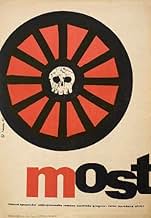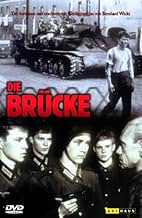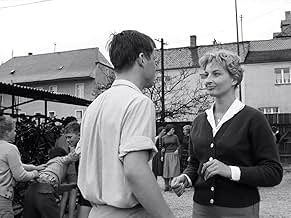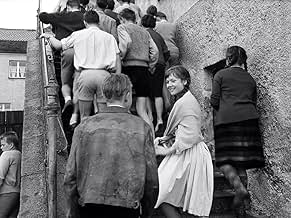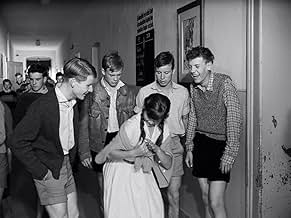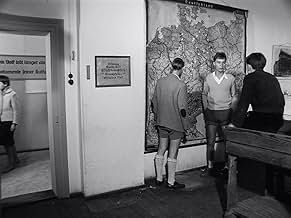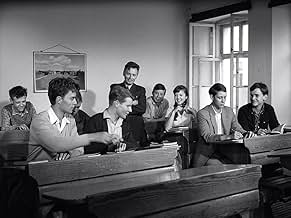IMDb-BEWERTUNG
7,9/10
9065
IHRE BEWERTUNG
1945, Deutschland liegt am Boden und niemand ist mehr da, um zu kämpfen, außer ein paar junge Spinte im Teenageralter.1945, Deutschland liegt am Boden und niemand ist mehr da, um zu kämpfen, außer ein paar junge Spinte im Teenageralter.1945, Deutschland liegt am Boden und niemand ist mehr da, um zu kämpfen, außer ein paar junge Spinte im Teenageralter.
- Für 1 Oscar nominiert
- 16 Gewinne & 1 Nominierung insgesamt
Volker Bohnet
- Hans Scholten
- (as Folker Bohnet)
Günter Hoffmann
- Sigi Bernhard
- (as Günther Hoffmann)
Empfohlene Bewertungen
We were shown this movie at school, so I always remembered it as a politically correct piece educational film - which it is, in a way. This is film with a clear purpose. It wants you to learn something. The amazing thing is that it is also a good film. Its message "War Is Bad" is brought across not so much by showing blood, death and destruction but by the means of classical tragedy: There are no "bad guys" in this film; on the contrary, most people try to do good, be humane. (E.g. the boys are told to guard the bridge in order to keep them away from the front.) But what they do results in disaster, because the evil is war itself.
Die Brücke was on Dutch or Belgian TV some 20 years ago, when I saw it. Like many others I was deeply impressed. There has been criticism on acting and directing. This criticism is correct. But it does not matter. What counts is the script. Only seldom I have seen a movie with a better script. Here a modified quote from The Good, the Bad and the Ugly applies: never seen wasted young lives so badly. With a fairly simple story Die Brücke makes mercilessly clear what war and National-Socialism is. I can understand, why nobody has the courage to do a remake. Perfection might lead to a lesser impact in this case. One can argue, that Paths of Glory and Hamburger Hill are better. Not a bad word about these two, but Die Brücke is emotionally the most gripping.
German war drama from Deutsche Film Hansa and director Bernhard Wicki. In the waning days of WW2, a group of German high school friends all get drafted into the army, much to their excitement. However, with literally only a single day's worth of training, they are sent to their hometown to guard a small bridge until it can be destroyed by a demolition crew. The young men take their task very seriously, leading to tragic results
The 100 minutes film spends the first hour establishing the characters of each of the young men, so that the frenetic last act becomes even more devastating, as these are fully fleshed out individuals instead of the too-frequent ciphers and cliches found in many war films. The tone is distinctly anti-war, but the movie is never preachy, and the futility of their actions is made apparent naturally, without contrivance. The filmmaking in the final stretch of the film is ahead of its time in the use of rapid edits, traveling camera shots, and zooms. The movie was nominated for the Best Foreign Language Film Oscar (it lost to Black Orpheus). Recommended.
The 100 minutes film spends the first hour establishing the characters of each of the young men, so that the frenetic last act becomes even more devastating, as these are fully fleshed out individuals instead of the too-frequent ciphers and cliches found in many war films. The tone is distinctly anti-war, but the movie is never preachy, and the futility of their actions is made apparent naturally, without contrivance. The filmmaking in the final stretch of the film is ahead of its time in the use of rapid edits, traveling camera shots, and zooms. The movie was nominated for the Best Foreign Language Film Oscar (it lost to Black Orpheus). Recommended.
A group of young students are ordered to protect a strategically totally unimportant bridge at the end of the war. The initial euphoria changes suddenly to fright while the Allies are entering. Probably one of the essential and most important anti-war films ever. Wicki convincingly captured the atmosphere of the last war days, this constant indecision between fear and hope and forlornness. Especially well made are the psychological portrays of the boys, their every day life in school, at home, within the clique and the mixture of real dedication and adventure mentality which leaves them to look at the war partly as national duty and partly as a romantic game. But as soon as the war collides with the life of the boys, the contrast between those close-ups of round-eyed, innocent child's faces and the churned up mud of the battlefield, as well as the bookish discourses of "courage" and "cowardice" makes the absurdity of the war pretty damn clear. Indeed, war is a game, but harrowing, arousing and bitter which has lost all gaily playfulness.
10bugs-32
In my opinion is the best war film I've ever seen. The story is one o the best examples of the nonsense and madness of war. Seems incredible that this movie has been done by Germany and released after 14 years since the end of the war. You can see a traumatic passage from childhood to maturity in the principal characters. The film is from the late fifties so there is no big special effects like "saving private Ryan". Also, the movie is not showing a major and historical battle, with a lot of soldiers and tanks fighting between explosions. In fact,the war scenes can be seen only in the last half hour. The final scene on the bridge is one of the most disturbing scenes of war films.
Wusstest du schon
- WissenswertesThe end credits suggest that the story relates to true events which supposedly happened on "April 27, 1945", but this specific story is fictitious, while the general use of teenage boys as soldiers in the last days of the Third Reich is accurate.
- PatzerWhen the boys are assembled at night, they are told they will be part of the 336th Division. That unit was destroyed and surrendered to the Soviets on the Eastern Front nearly a year earlier in 1944 and was never reformed.
- Zitate
Sigi Bernhard: Whoever defends one square foot of German soil defends Germany!
- Alternative VersionenAn English dubbed version was released in the USA in 1963.
- VerbindungenEdited into Bernhard Victor Christoph Carl von Bülow genannt Loriot (2008)
Top-Auswahl
Melde dich zum Bewerten an und greife auf die Watchlist für personalisierte Empfehlungen zu.
Details
- Laufzeit1 Stunde 43 Minuten
- Farbe
- Sound-Mix
Zu dieser Seite beitragen
Bearbeitung vorschlagen oder fehlenden Inhalt hinzufügen


